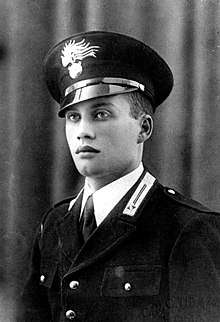Salvo D'Acquisto
Salvo D'Acquisto (15 October[1] 1920 in Naples – 23 September 1943 in Fiumicino[2]) was a member of the Italian Carabinieri during the Second World War. He was posthumously awarded the Gold Medal of Military Valor and is being considered for beatification for sacrificing himself to save 22 civilians from being executed by German soldiers.

Life
Salvo D'Acquisto was born in Naples, the eldest of eight children, three of whom died as infants and another as a child. His father worked in a chemical factory. He left school at the age of 14, as was customary for working-class boys at the time.[3]
He volunteered to join the Carabinieri in 1939 and left for Libya the next year, a few months before the start of the Second World War. After being wounded in the leg, he remained with his division until he contracted malaria. He returned to Italy in 1942 to attend officer school. He graduated as a vice-sergeant and was assigned to an outpost in Torre in Pietra, a little rural center on the Via Aurelia not far from Rome.
On 25 July 1943, Benito Mussolini was overthrown, and the new Italian government negotiated secretly with the Allies to switch sides. An armistice was officially announced on 8 September.
Death
After the 9–11 September fighting in Rome, elements of the German 2nd Parachute Division [4] were detached to coastal defense duties, and a small unit was camped near an old military installation previously used by the Guardia di Finanza, in the vicinity of Palidoro, frazione of Fiumicino, which was in the territorial jurisdiction of the station of Torre in Pietra, another frazione of the same municipality. Here, on 22 September, German soldiers were inspecting boxes of abandoned munitions when there was an explosion. Two died and two others were wounded.[3]
The commander of the German detachment blamed the death on "unnamed locals" and demanded the cooperation of the local Carabinieri post, at the moment under D'Acquisto's temporary command. The next morning, D'Acquisto, having gathered some information, tried in vain to explain that the death was an accident, but the Germans insisted on their version of events and demanded reprisals, according to a standing order issued by Feldmarschall Kesselring a few days before.
On 23 September, the Germans conducted searches and arrested 22 local residents. An armed squad took D'Acquisto by force from the station to the Torre di Palidoro, an ancient watchtower, where the prisoners were gathered. Under interrogation, all of the civilians said that they were innocent. When the Germans again demanded the names of the responsible persons, D'Acquisto replied that there were none – the explosion was accidental. The Germans ridiculed, insulted, and beat him, and tore his uniform.
Suddenly, the prisoners were handed shovels and forced to dig a mass grave for their own burial after execution. The digging went on for some time; when it was completed, it was obvious the Germans meant to carry out their threat. D'Acquisto then "confessed" to the alleged crime, declared that he alone was responsible for the "murder" and that the civilians were innocent, and demanded that they be released right away. One of those freed, 17-[3] or 18-year-old[5] Angelo Amadio, witnessed the execution by firing squad. D'Acquisto was 22. His remains are preserved at the Church of St. Clara in Naples, in the first chapel on the left, near the entrance.
Legacy
He is considered to be a Roman Catholic martyr and has been proposed for beatification by the Holy See. On 26 February 2001, Pope John Paul II in his Address to the Italian Carabinieri stated, “The history of the Italian Carabinieri shows that the heights of holiness can be reached in the faithful and generous fulfillment of the duties of one's state. I am thinking here of your colleague, Sergeant Salvo D'Acquisto, awarded a gold medal for military valor, whose cause of beatification is under way.”[6]
A film, Salvo D'Acquisto (1974), was made about his sacrifice, directed by Romula Guerrieri and starring Massimo Ranieri. A 2003 TV mini-series was directed by Alberto Sironi and starred Beppe Fiorello.[7]
An Italian postage stamp was issued in 1975 to commemorate him. The portrait was painted by the Italian artist Silvano Campeggi.[8]
There are monuments honoring D'Acquisto, including in his native Naples,[9] on the Via Aurelia near Rome,[10] and in front of the train station at Cisterna.
Quote
"We have to conform ourselves to God's will whatever the cost in suffering or sacrifice."
References
- "Convegno su "La figura del Servo di Dio Salvo D'Acquisto, Vice Brigadiere dei Carabinieri"" (in Italian). Arma dei Carabinieri. Retrieved 2008-04-14.
- http://www.ilmessaggero.it/rubriche/accadde_oggi/brigadiere_carabinieri_fucilato_torre_impietra-1242144.html
- Fr. Alexander Lucie-Smith (26 July 2012). "The incredible sacrifice of Salvo D'Acquisto". Catholic Herald.
- see page 44 Carlo Gentile - ITINERARI DI GUERRA: LA PRESENZA DELLE TRUPPE TEDESCHE NEL LAZIO OCCUPATO 1943-1944
- "E' morto Angelo Amadio, ultimo testimone del sacrificio di Salvo D'Acquisto (Angelo Amadio, last witness to the sacrifice of Salvo D'Acquisto, is dead". Il Messaggero. 30 December 2007.
- Address to the Italian Carabinieri who serve in the Lazio Region
- Salvo D'Acquisto (2003) on IMDb
- Arma dei Carabinieri – Home – L'Editoria – Pubblicazioni – Francobolli – V. Brig. Salvo d'Acquisto
- "Monuments to The Four Days of Naples & Salvo d'Acquisto". Archived from the original on 8 September 2012. Retrieved 20 April 2013.
- Portelli, Alessandro (2012). "Myth and Morality in the History of the Italian Resistance: the Hero of Palidoro". History Workshop Journal. 74 (1).
External links
- "Convegno su "La figura del Servo di Dio Salvo D'Acquisto, Vice Brigadiere dei Carabinieri"" (in Italian). Arma dei Carabinieri. Retrieved 2008-04-14.
- "Salvo D'Acquisto" (in Italian). Arma dei Carabinieri. Retrieved 2008-04-14.
- "Salvo D'Acquisto" (in Italian). Pagine Culturali.it. Archived from the original on 2008-03-28. Retrieved 2008-04-14.
- "Salvo D'Acquisto" (in Italian). Associazione Nazionale Partigiani d'Italia. Archived from the original on 2008-05-03. Retrieved 2008-04-14.
- "Salvo D'Acquisto" (in Italian). Centro studi della Resistenza. Archived from the original on 2008-05-03. Retrieved 2008-04-14.